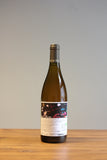- Home
- The Wines of Ca 'de Noci
- Ca' de Noci: Le Rose 2020


Ca' de Noci: Le Rose 2020
- €28,90
Le Rose Frizzante: A Sparkling Revelation of Malvasia di Candia Aromatica
Some white grape varieties are best suited for classic vinification (Riesling, Sylvaner, Vernaccia, Pecorino ...). Others excel both as macerated and directly pressed wines (Ribolla Gialla, Vermentino, Timorasso, Nosiola, Fiano, Garganega…). Then there are those that only reveal their true character with skin contact (Traminer, Pinot Grigio, Albana, Ansonica, various types of Trebbiano). Malvasia di Candia Aromatica belongs firmly in the latter group: as a direct press wine, it can be as dull as a Parma vs. Sassuolo soccer match, but fermented on the skins, it transforms into an experience akin to Juve vs. Napoli.
Alberto & Giovanni Masini understand this perfectly and give their Le Rose Frizzante Malvasia di Candia Aromatica time on the skins. To temper the naturally high tannin content, they avoid pressing the wine and use only the free-run juice. The wine is first aged in stainless steel tanks before undergoing secondary fermentation in the bottle. Le Rose is neither disgorged, filtered, nor sulfured.
Style
The warm orange hue of the wine is echoed on the nose, where notes of chestnut honey, bread crust, and ripe yellow fruits emerge. On the palate, intensity and depth are harmoniously combined with a sense of lightness and vitality. Le Rose evolves with aeration, revealing floral and fruit nuances as it opens up.
Datasheet
Grape Variety: Malvasia di Candia Aromatica
Vineyard: Located at 150–230 meters, southeast-facing, with gravelly soils over a sandstone and gypsum-rich substrate.
Harvest: By hand, in 15 kg crates.
Fermentation: Spontaneous | wild yeasts, fermented on the skins.
Aging: A few months in stainless steel and cement, followed by secondary fermentation in the bottle. No disgorgement, no dosage.
Filtration: None.
SO₂: Unsulfured.
Alcohol Content: 10.5% vol.
Closure: Natural cork.
Serving Temperature: 8–10°C.
Perfect Drinking Window: Ready to drink now – 2030.
Content and Price per Liter: 0.75 l (€33.75/l).
All winemakers listed at Vinonudo work with compost, organic fertilizers, and natural preparations in their vineyards, abstaining from the use of herbicides, pesticides, and synthetic fertilizers.
Newsletter
Who knows more, tastes more. Once a week there is news about our wines, winegrowers and events.
© 2025 vinonudo | Shopify Theme by Mile High Themes | Powered by Shopify






